So, I am trying to create a Spark session in Python 2.7 using the following:
#Initialize SparkSession and SparkContext
from pyspark.sql import SparkSession
from pyspark import SparkContext
#Create a Spark Session
SpSession = SparkSession \
.builder \
.master("local[2]") \
.appName("V2 Maestros") \
.config("spark.executor.memory", "1g") \
.config("spark.cores.max","2") \
.config("spark.sql.warehouse.dir", "file:///c:/temp/spark-warehouse")\
.getOrCreate()
#Get the Spark Context from Spark Session
SpContext = SpSession.sparkContext
I get the following error pointing to the python\lib\pyspark.zip\pyspark\java_gateway.pypath`
Exception: Java gateway process exited before sending the driver its port number
Tried to look into the java_gateway.py file, with the following contents:
import atexit
import os
import sys
import select
import signal
import shlex
import socket
import platform
from subprocess import Popen, PIPE
if sys.version >= '3':
xrange = range
from py4j.java_gateway import java_import, JavaGateway, GatewayClient
from py4j.java_collections import ListConverter
from pyspark.serializers import read_int
# patching ListConverter, or it will convert bytearray into Java ArrayList
def can_convert_list(self, obj):
return isinstance(obj, (list, tuple, xrange))
ListConverter.can_convert = can_convert_list
def launch_gateway():
if "PYSPARK_GATEWAY_PORT" in os.environ:
gateway_port = int(os.environ["PYSPARK_GATEWAY_PORT"])
else:
SPARK_HOME = os.environ["SPARK_HOME"]
# Launch the Py4j gateway using Spark's run command so that we pick up the
# proper classpath and settings from spark-env.sh
on_windows = platform.system() == "Windows"
script = "./bin/spark-submit.cmd" if on_windows else "./bin/spark-submit"
submit_args = os.environ.get("PYSPARK_SUBMIT_ARGS", "pyspark-shell")
if os.environ.get("SPARK_TESTING"):
submit_args = ' '.join([
"--conf spark.ui.enabled=false",
submit_args
])
command = [os.path.join(SPARK_HOME, script)] + shlex.split(submit_args)
# Start a socket that will be used by PythonGatewayServer to communicate its port to us
callback_socket = socket.socket(socket.AF_INET, socket.SOCK_STREAM)
callback_socket.bind(('127.0.0.1', 0))
callback_socket.listen(1)
callback_host, callback_port = callback_socket.getsockname()
env = dict(os.environ)
env['_PYSPARK_DRIVER_CALLBACK_HOST'] = callback_host
env['_PYSPARK_DRIVER_CALLBACK_PORT'] = str(callback_port)
# Launch the Java gateway.
# We open a pipe to stdin so that the Java gateway can die when the pipe is broken
if not on_windows:
# Don't send ctrl-c / SIGINT to the Java gateway:
def preexec_func():
signal.signal(signal.SIGINT, signal.SIG_IGN)
proc = Popen(command, stdin=PIPE, preexec_fn=preexec_func, env=env)
else:
# preexec_fn not supported on Windows
proc = Popen(command, stdin=PIPE, env=env)
gateway_port = None
# We use select() here in order to avoid blocking indefinitely if the subprocess dies
# before connecting
while gateway_port is None and proc.poll() is None:
timeout = 1 # (seconds)
readable, _, _ = select.select([callback_socket], [], [], timeout)
if callback_socket in readable:
gateway_connection = callback_socket.accept()[0]
# Determine which ephemeral port the server started on:
gateway_port = read_int(gateway_connection.makefile(mode="rb"))
gateway_connection.close()
callback_socket.close()
if gateway_port is None:
raise Exception("Java gateway process exited before sending the driver its port number")
# In Windows, ensure the Java child processes do not linger after Python has exited.
# In UNIX-based systems, the child process can kill itself on broken pipe (i.e. when
# the parent process' stdin sends an EOF). In Windows, however, this is not possible
# because java.lang.Process reads directly from the parent process' stdin, contending
# with any opportunity to read an EOF from the parent. Note that this is only best
# effort and will not take effect if the python process is violently terminated.
if on_windows:
# In Windows, the child process here is "spark-submit.cmd", not the JVM itself
# (because the UNIX "exec" command is not available). This means we cannot simply
# call proc.kill(), which kills only the "spark-submit.cmd" process but not the
# JVMs. Instead, we use "taskkill" with the tree-kill option "/t" to terminate all
# child processes in the tree (http://technet.microsoft.com/en-us/library/bb491009.aspx)
def killChild():
Popen(["cmd", "/c", "taskkill", "/f", "/t", "/pid", str(proc.pid)])
atexit.register(killChild)
# Connect to the gateway
gateway = JavaGateway(GatewayClient(port=gateway_port), auto_convert=True)
# Import the classes used by PySpark
java_import(gateway.jvm, "org.apache.spark.SparkConf")
java_import(gateway.jvm, "org.apache.spark.api.java.*")
java_import(gateway.jvm, "org.apache.spark.api.python.*")
java_import(gateway.jvm, "org.apache.spark.ml.python.*")
java_import(gateway.jvm, "org.apache.spark.mllib.api.python.*")
# TODO(davies): move into sql
java_import(gateway.jvm, "org.apache.spark.sql.*")
java_import(gateway.jvm, "org.apache.spark.sql.hive.*")
java_import(gateway.jvm, "scala.Tuple2")
return gateway
I am pretty new to Spark and Pyspark, hence unable to debug the issue here. I also tried to look at some other suggestions: Spark + Python - Java gateway process exited before sending the driver its port number? and Pyspark: Exception: Java gateway process exited before sending the driver its port number
but unable to resolve this so far. Please help!
Here is how the spark environment looks like:
# This script loads spark-env.sh if it exists, and ensures it is only loaded once.
# spark-env.sh is loaded from SPARK_CONF_DIR if set, or within the current directory's
# conf/ subdirectory.
# Figure out where Spark is installed
if [ -z "${SPARK_HOME}" ]; then
export SPARK_HOME="$(cd "`dirname "$0"`"/..; pwd)"
fi
if [ -z "$SPARK_ENV_LOADED" ]; then
export SPARK_ENV_LOADED=1
# Returns the parent of the directory this script lives in.
parent_dir="${SPARK_HOME}"
user_conf_dir="${SPARK_CONF_DIR:-"$parent_dir"/conf}"
if [ -f "${user_conf_dir}/spark-env.sh" ]; then
# Promote all variable declarations to environment (exported) variables
set -a
. "${user_conf_dir}/spark-env.sh"
set +a
fi
fi
# Setting SPARK_SCALA_VERSION if not already set.
if [ -z "$SPARK_SCALA_VERSION" ]; then
ASSEMBLY_DIR2="${SPARK_HOME}/assembly/target/scala-2.11"
ASSEMBLY_DIR1="${SPARK_HOME}/assembly/target/scala-2.10"
if [[ -d "$ASSEMBLY_DIR2" && -d "$ASSEMBLY_DIR1" ]]; then
echo -e "Presence of build for both scala versions(SCALA 2.10 and SCALA 2.11) detected." 1>&2
echo -e 'Either clean one of them or, export SPARK_SCALA_VERSION=2.11 in spark-env.sh.' 1>&2
exit 1
fi
if [ -d "$ASSEMBLY_DIR2" ]; then
export SPARK_SCALA_VERSION="2.11"
else
export SPARK_SCALA_VERSION="2.10"
fi
fi
Here is how my Spark environment is set up in Python:
import os
import sys
# NOTE: Please change the folder paths to your current setup.
#Windows
if sys.platform.startswith('win'):
#Where you downloaded the resource bundle
os.chdir("E:/Udemy - Spark/SparkPythonDoBigDataAnalytics-Resources")
#Where you installed spark.
os.environ['SPARK_HOME'] = 'E:/Udemy - Spark/Apache Spark/spark-2.0.0-bin-hadoop2.7'
#other platforms - linux/mac
else:
os.chdir("/Users/kponnambalam/Dropbox/V2Maestros/Modules/Apache Spark/Python")
os.environ['SPARK_HOME'] = '/users/kponnambalam/products/spark-2.0.0-bin-hadoop2.7'
os.curdir
# Create a variable for our root path
SPARK_HOME = os.environ['SPARK_HOME']
# Create a variable for our root path
SPARK_HOME = os.environ['SPARK_HOME']
#Add the following paths to the system path. Please check your installation
#to make sure that these zip files actually exist. The names might change
#as versions change.
sys.path.insert(0,os.path.join(SPARK_HOME,"python"))
sys.path.insert(0,os.path.join(SPARK_HOME,"python","lib"))
sys.path.insert(0,os.path.join(SPARK_HOME,"python","lib","pyspark.zip"))
sys.path.insert(0,os.path.join(SPARK_HOME,"python","lib","py4j-0.10.1-src.zip"))
#Initialize SparkSession and SparkContext
from pyspark.sql import SparkSession
from pyspark import SparkContext

